If you're looking for the best basement air purifiers to keep your air clean and healthy, consider these top picks. The LEVOIT Crucial 200S-P provides exceptional coverage and a smart filtration system. The Winix 5500-2 uses True HEPA technology to capture allergens, while the PuroAir offers a quiet operation for a peaceful environment. For larger spaces, the Air Purifier with an H14 filter is highly efficient. Finally, the MOOKA H13 combines performance with stylish design. Pick one that fits your needs for ideal air quality and comfort—there's even more valuable insight to guide your decision ahead!
LEVOIT Air Purifier for Large Rooms (Vital 200S-P)
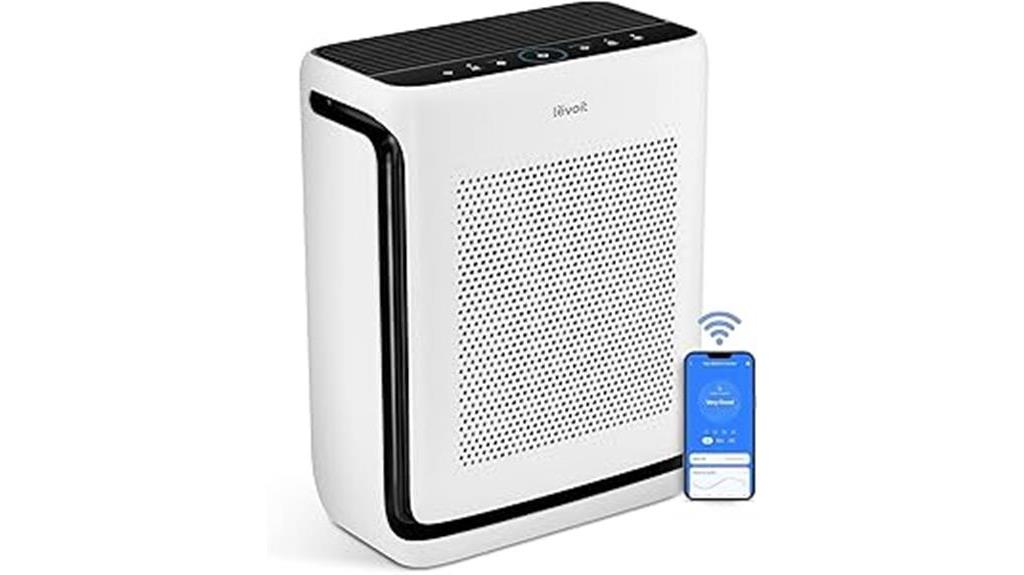
If you're looking for an air purifier that can tackle the challenges of large spaces, the LEVOIT Essential 200S-P is an excellent choice. It's designed for rooms up to 1800 square feet, purifying the air once an hour with a CADR of 242 CFM. The 3-stage filtration system captures 99.97% of ultra-fine particles like pollen and pet dander. I love how it operates quietly in Sleep Mode, making it perfect for overnight use. Plus, the smart features allow me to control it via the VeSync app or Alexa, which is super convenient. Users rave about its effectiveness in improving air quality, and I've noticed a significant difference in my basement. It's truly a fantastic investment for cleaner air!
Best For: Individuals with allergies or pet owners seeking effective air purification in large spaces.
Pros:
- Quiet operation in Sleep Mode allows for undisturbed rest.
- Smart features enable control via the VeSync app or Alexa, enhancing convenience.
- High filtration efficiency, capturing 99.97% of ultra-fine particles like dust and pollen.
Cons:
- Initial setup may require some time for users unfamiliar with smart devices.
- Filter replacements can add to ongoing maintenance costs, although they are reasonably priced.
- Size may be cumbersome for smaller rooms or limited spaces.
Winix 5500-2 Air Purifier with True HEPA Filter
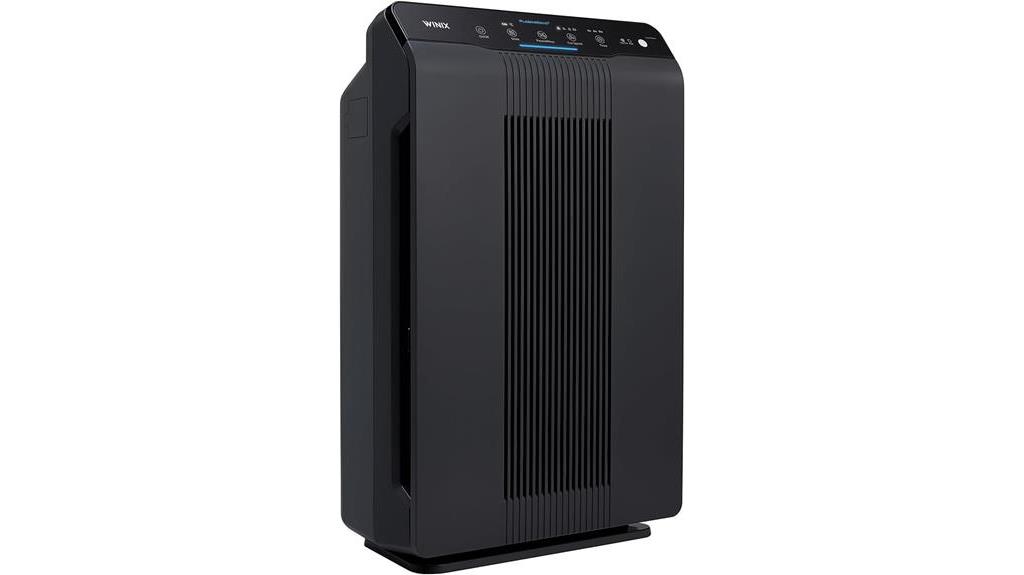
The Winix 5500-2 Air Purifier with True HEPA Filter is an excellent choice for anyone battling allergies or dealing with pet hair in their basement. This purifier effectively captures 99.97% of airborne pollutants, including dust mites and pollen, thanks to its True HEPA filter. I appreciate the washable AOC carbon filter that tackles stubborn household odors. With PlasmaWave Technology, it neutralizes pollutants without releasing harmful ozone. The smart sensors automatically adjust the fan speed based on air quality, and the sleep mode operates quietly at just 27.8 dB. Covering up to 360 sq. ft., this unit is perfect for medium to large spaces. With a customer rating of 4.7 stars, it's a trusted choice for cleaner air!
Best For: Those seeking an effective air purifier to alleviate allergies and reduce pet hair in medium to large spaces.
Pros:
- Effective filtration: True HEPA filter captures 99.97% of airborne pollutants, improving air quality significantly.
- Quiet operation: Sleep mode operates at a low noise level of just 27.8 dB, making it suitable for bedrooms.
- Smart features: Automatic fan speed adjustment and PlasmaWave Technology enhance convenience and efficiency.
Cons:
- Filter replacement cost: Filters need to be replaced every 12 months, which can add to long-term costs.
- Size: At 14.9L x 7.8W x 23.6H inches, it may take up more space than smaller models.
- Weight: Weighing 17.5 lbs, it may be cumbersome to move between rooms.
PuroAir Air Purifier for Homes
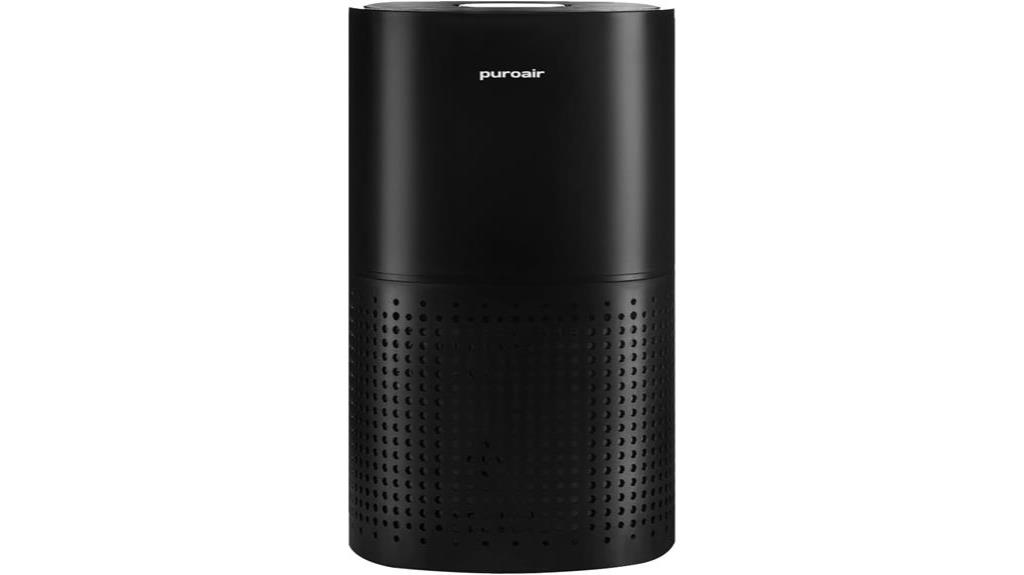
For anyone seeking a powerful solution to indoor air quality, the PuroAir Air Purifier for Homes stands out with its impressive coverage of 1,115 square feet. It cleans the air automatically 24/7, making it perfect for both homes and offices. Its filtration system captures up to 99% of smoke, pollen, and common pollutants, even those as small as 0.1 microns. I've noticed a significant improvement in air quality within just 15 minutes of use. The quiet operation is another bonus, as the fan noise is minimal on low settings. While the replacement filters can be pricey, the ease of maintenance and features like the smart particle sensor and sleep mode make it a worthwhile investment for cleaner air.
Best For: Individuals and families looking for an effective air purification solution to alleviate allergies and improve indoor air quality in large spaces.
Pros:
- Covers a large area of up to 1,115 sq ft, making it suitable for both homes and offices.
- Smart particle sensor automatically adjusts the power based on air quality for optimal performance.
- Quiet operation with minimal fan noise on low and medium settings, ideal for use in bedrooms or workspaces.
Cons:
- Replacement filters can be expensive, which may add to the overall maintenance cost.
- Lightweight construction may raise concerns regarding durability over time.
- Voltage compatibility issues for international shipping may require additional equipment for proper use.
Air Purifier for Large Rooms with H14 True HEPA Filter
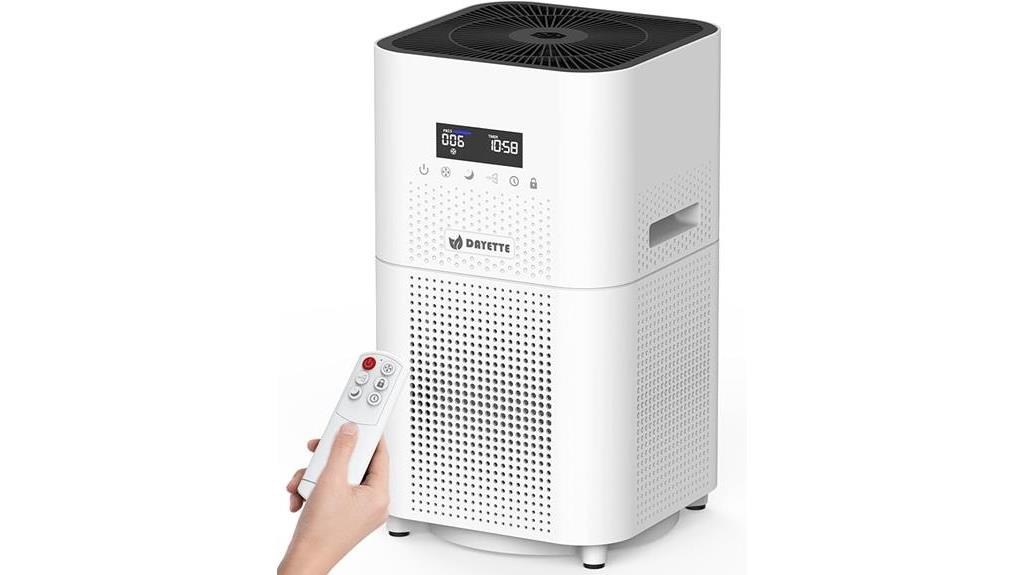
Designed specifically for large spaces, the Dayette AP401 air purifier stands out with its H14 true HEPA filter, making it an exceptional choice for anyone battling allergens and airborne pollutants in expansive rooms. This purifier can handle areas up to 3000 sq ft, using Turbo-air Technology and a 360° air inlet for continuous purification. The upgraded H14 filter captures an impressive 99.997% of particles as small as 0.1 microns, while the activated carbon filter neutralizes pesky odors. With a CADR exceeding 400 m³/h, this unit guarantees efficient air circulation. Plus, its ENERGY STAR certification means it's eco-friendly and cost-effective. Users love the real-time air quality monitoring and the quiet sleep mode, making it a reliable choice for cleaner air.
Best For: Individuals seeking an effective air purification solution for large rooms, particularly those with allergies, pets, or cooking odors.
Pros:
- Highly efficient H14 true HEPA filter captures 99.997% of particles as small as 0.1 microns.
- Real-time air quality monitoring with a color-coded system for easy understanding of air conditions.
- Quiet operation at 22dB in sleep mode, ensuring minimal disturbance during rest.
Cons:
- Larger size may not fit well in smaller spaces or apartments.
- Initial cost may be higher compared to basic air purifiers.
- Filter replacement can add to long-term maintenance costs.
MOOKA H13 True HEPA Air Purifier for Large Rooms
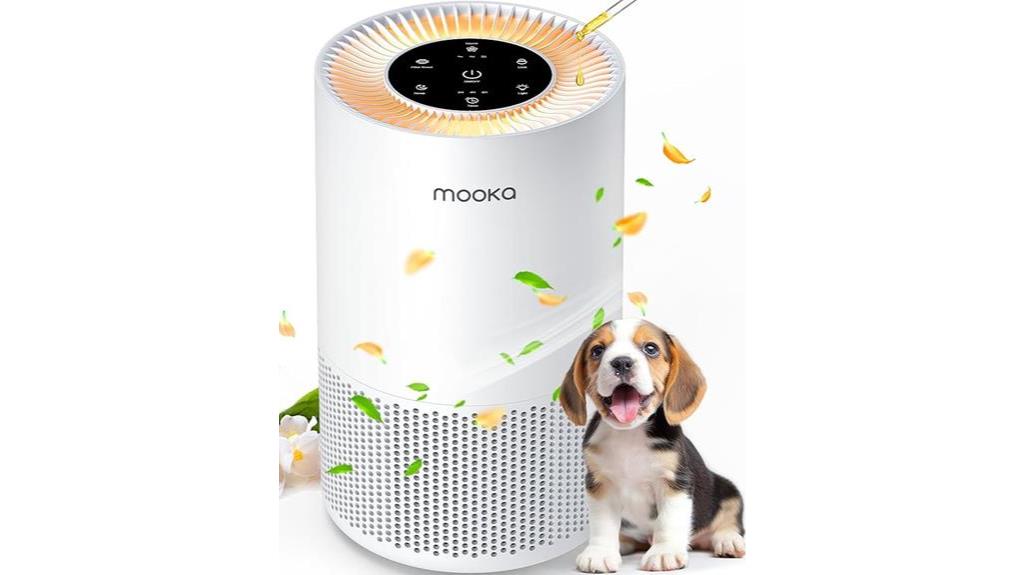
Looking for an air purifier that tackles allergens and odors effectively? The MOOKA H13 True HEPA Air Purifier is a fantastic option for larger spaces, covering up to 1200 square feet. I love its ability to capture dust, pollen, smoke, and pet dander with its imported H13 HEPA filter. It operates quietly at just 13dB, making it perfect for bedrooms or offices. With four fan speeds, sleep mode, and aromatherapy features, it enhances my living space's ambiance. Plus, the compact design fits nicely anywhere. I appreciate the energy-efficient operation and the filter replacement indicator, ensuring peak performance. With a 4.5-star rating from nearly 1,500 users, it's clear others find it equally effective.
Best For: The MOOKA H13 True HEPA Air Purifier is best for pet owners, families with children, and anyone seeking to improve indoor air quality in larger rooms.
Pros:
- Compact design makes it suitable for various spaces like bedrooms, living rooms, and offices.
- Ultra-quiet operation at just 13dB allows for minimal disturbance during sleep or work.
- Energy-efficient with a filter replacement indicator, ensuring ongoing effective performance.
Cons:
- Filter replacement may be needed every 3-6 months, which could be frequent in high-dust environments.
- Some users have noted concerns about the cost of replacement filters over time.
- Limited aromatherapy feature might not cater to all preferences for essential oils.
Factors to Consider When Choosing Basement Air Purifiers
When you're choosing a basement air purifier, consider factors like room size coverage and filtration efficiency standards to guarantee it meets your needs. You'll also want to think about noise levels and any smart features that could enhance your experience. Finally, consider the maintenance requirements and filter lifespan to keep your air clean without constant hassle.
Room Size Coverage
Choosing the right air purifier for your basement hinges on understanding room size coverage. Each air purifier is typically rated for specific square footage, so it's essential to select one that effectively cleans the air in your space. If you have an open or multi-room basement, look for purifiers designed for larger areas, covering from 1,000 to over 3,000 square feet.
Another important metric is the Clean Air Delivery Rate (CADR). This indicates how efficiently the purifier can clean air in your basement, with higher CADR values being more suitable for larger spaces. Aim for an air purifier that can achieve at least one air change per hour in your basement. Larger basements may require units with higher capacity to maintain good air quality.
Filtration Efficiency Standards
Filtration efficiency standards play an essential role in selecting the right air purifier for your basement. When shopping, look for HEPA (High-Efficiency Particulate Air) filters, as they capture at least 99.97% of particles that are 0.3 microns in size. This makes them highly effective against allergens, dust, and smoke. True HEPA filters are tested to meet strict efficiency standards, while H13 and H14 filters take it a step further, capturing 99.97% and 99.997% of particles, respectively.
Additionally, consider air purifiers that include activated carbon filters. These filters work to remove odors and volatile organic compounds (VOCs), considerably enhancing the air quality in your basement. Another vital metric is the Clean Air Delivery Rate (CADR), which indicates how quickly an air purifier can filter specific pollutants. Higher CADR values generally suggest better performance and efficiency.
Noise Level Considerations
Selecting an air purifier for your basement involves more than just filtration efficiency; noise level is another critical factor. You'll want to pay attention to the decibel (dB) ratings of different models, as quieter purifiers typically operate between 20-30 dB. This range is ideal for basements, where excessive noise can be disruptive.
Many air purifiers come with a "sleep mode" that reduces fan speed and noise, sometimes dropping to as low as 22 dB. This feature guarantees minimal disturbance during nighttime hours, making it easier for you to relax or sleep.
It's crucial to take into account how noise levels change with different fan speeds. Higher settings can push noise levels beyond 50 dB, which may be bothersome in a quiet environment. Since basements often have existing ambient noise from appliances, choosing an air purifier with low noise ratings can greatly enhance your comfort.
Ultimately, opting for a model that operates quietly will make your basement a more enjoyable space for relaxation, work, or study. So, make noise level a priority when selecting your air purifier.
Smart Features Availability
Smart features are increasingly common in modern air purifiers, and they can greatly enhance your basement's air quality management. With app control, you can monitor air quality and adjust settings from anywhere, making it convenient to keep your space fresh. Many models come equipped with sensors that automatically adjust fan speeds based on detected air quality, ensuring ideal purification without you needing to lift a finger.
Programmable settings and timers allow you to schedule operation times, which not only enhances energy efficiency but also fits seamlessly into your routine. If you prefer hands-free operation, look for units that are compatible with smart home systems; voice control makes managing air quality effortless.
Advanced models may feature real-time air quality monitoring with visual indicators, so you can easily assess and respond to changing conditions. These smart capabilities not only add convenience but also empower you to maintain a healthier environment in your basement. By considering air purifiers with these features, you'll be better equipped to breathe easy and keep your indoor air clean.
Maintenance and Filter Lifespan
Maintaining your air purifier is vital for guaranteeing it operates efficiently and effectively, especially in a basement environment where air quality can be compromised. Regular upkeep of the pre-filter, such as cleaning it with water, can greatly extend the lifespan of the main filters. This not only boosts performance but also leads to cost savings over time.
Most HEPA filters need replacement roughly every 12 months, but this can vary based on your usage and surrounding conditions. It's important to monitor filter indicators or change them according to the actual air quality in your basement. If you have pets, smoke, or high dust levels, you might need to replace filters more frequently.
Opt for filters with high efficiency ratings, like H13 or True HEPA, which can capture particles as small as 0.1 microns. However, remember that their effectiveness diminishes over time, making regular replacement necessary for ideal air quality.
Some air purifiers include filter replacement indicators, helping you stay informed about when it's time for a change. Keeping track of maintenance will guarantee your air purifier continues to perform at peak efficiency, creating a healthier environment for you and your family.
Energy Efficiency Ratings
When choosing a basement air purifier, energy efficiency ratings play an essential role in ensuring you get the most value for your investment. Look for models with ENERGY STAR certification, as these units use less energy while maintaining effective performance. This can lead to lower utility bills over time, making your air purifier more cost-effective.
Pay attention to the wattage of the air purifier. Models that operate at lower wattages while still providing an adequate Clean Air Delivery Rate (CADR) can save you money in the long run. You should also consider the annual energy consumption, measured in kilowatt-hours (kWh), which allows you to estimate the total operating cost over a year for better budgeting.
Additionally, some air purifiers come with energy-saving modes or auto shut-off features, which enhance energy efficiency and help reduce unnecessary electricity usage. By comparing energy efficiency ratings alongside purification capabilities, you can choose a unit that balances performance with sustainability. This way, you not only breathe cleaner air but also contribute to lower energy consumption, benefiting both your health and your wallet.
Odor Removal Capability
Odor removal capability is often a crucial factor to evaluate when choosing an air purifier for your basement. You'll want to look for models that include activated carbon filters, as these are effective at absorbing and neutralizing odors from mold, dampness, and household chemicals. When comparing options, pay attention to the Clean Air Delivery Rate (CADR) rating specifically for odors; a higher CADR guarantees faster and more efficient removal of unpleasant smells.
Additionally, consider air purifiers that feature advanced technologies like PlasmaWave, which can break down pollutants at a molecular level without producing harmful ozone. Regular maintenance is essential, too—cleaning or replacing pre-filters and carbon filters will keep your unit performing at its best.
Frequently Asked Questions
How Often Should I Replace the Filters in My Air Purifier?
You should replace the filters in your air purifier every three to six months, but this can vary based on your usage and environment. If you notice reduced airflow or a musty smell, it's definitely time for a change. Regularly checking your filter can help maintain peak performance and guarantee you're breathing clean air. Always refer to your specific model's guidelines for the best results and recommendations tailored to your needs.
Can Air Purifiers Eliminate Odors From Pets and Smoke?
Think of air purifiers as your home's secret weapon against unwanted odors. Yes, they can effectively eliminate odors from pets and smoke. They work by using filters and activated carbon to trap and neutralize those pesky smells. However, not all purifiers are created equal. You'll want one specifically designed for odor removal to tackle these challenges. Regularly replacing the filters helps maintain their efficiency, ensuring your space stays fresh and inviting.
Are Air Purifiers Safe for Children and Pets?
Yes, air purifiers are generally safe for children and pets. They help improve indoor air quality by removing allergens, dust, and odors, making your home healthier for your loved ones. Just make certain to choose a model with a HEPA filter and avoid ozone-generating purifiers, as ozone can be harmful. Regular maintenance, like changing filters, guarantees your air purifier operates effectively, providing a safe environment for everyone in your home.
Do Air Purifiers Consume a Lot of Electricity?
Air purifiers can be power-hungry, but they don't always drain your wallet. Most models consume about 50 to 100 watts, which isn't too bad for the cleaner air they provide. You'll find that if you run your purifier consistently, your electricity bill might rise slightly, but the benefits of fresh air often outweigh the costs. Just check the energy rating before you buy to guarantee you're making a smart choice!
How Do I Know the Right Size Air Purifier for My Basement?
To choose the right size air purifier for your basement, you'll need to take into account the room's square footage and ceiling height. Measure your space, then check the purifier's specifications for its coverage area. Aim for a model that can handle slightly more than your basement's size for peak performance. You should also look for features like CADR ratings, which indicate how quickly it can clean the air in your space.
Wrapping Up
In the quest for clean air, choosing the right basement air purifier is like finding the right key to open a treasure chest of health benefits. With options like the LEVOIT and Winix, you've got solid choices to breathe easy and stay refreshed. Remember, just as a lighthouse guides ships to safety, a good air purifier can guide you to a healthier living environment. Don't underestimate the power of fresh air—your well-being deserves it!

Hi, I’m Charlie, and I cover all things laundry here at Appliance Mastery.
I’ve spent over eight years working on washing machines, dryers, and dishwashers. I also have a degree in mechanical engineering, which helps me understand how these appliances really work.
I try to make every guide clear and practical. If you’re stuck with a noisy dryer or a leaking washer, I’ll help you figure out what’s wrong and how to fix it.
